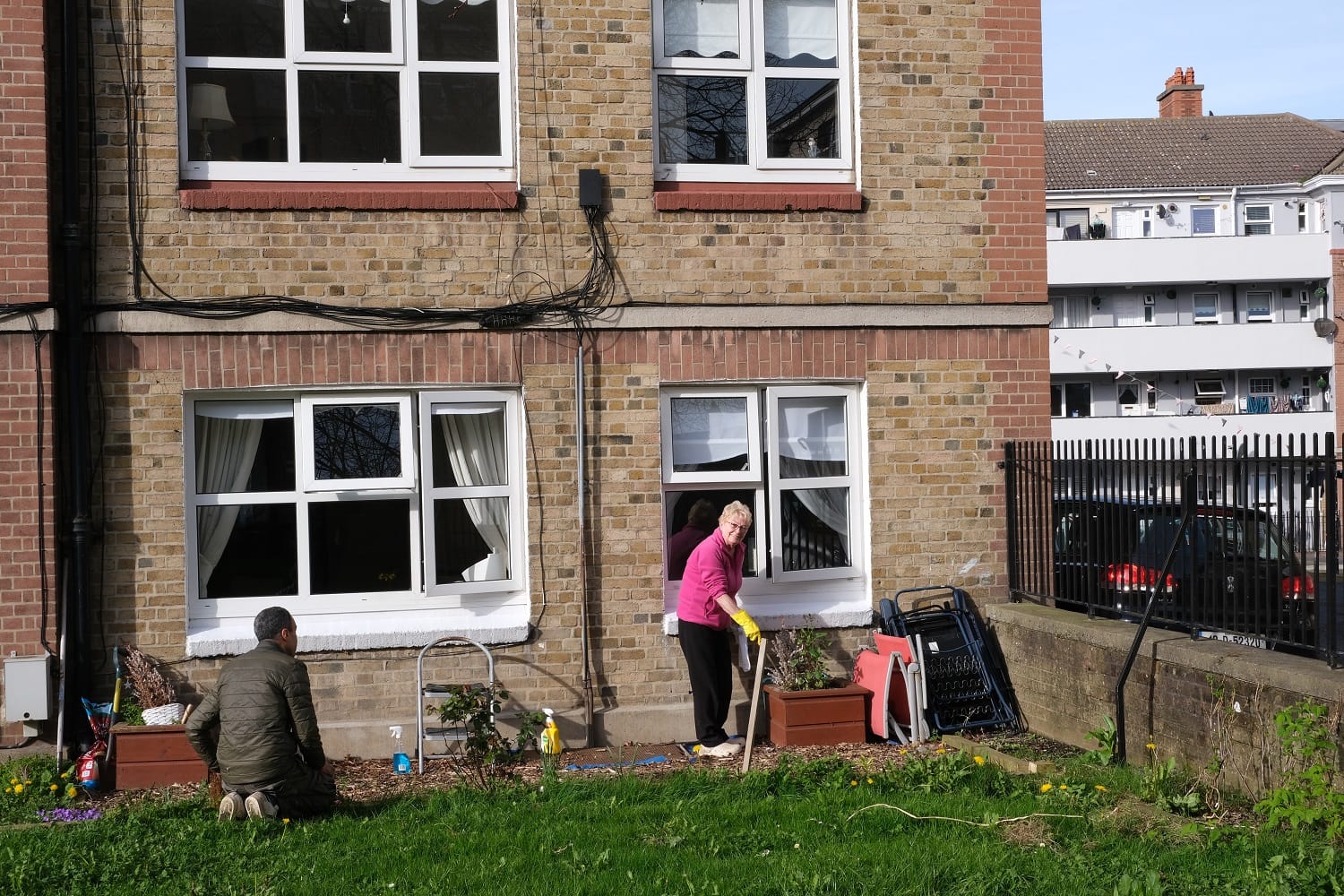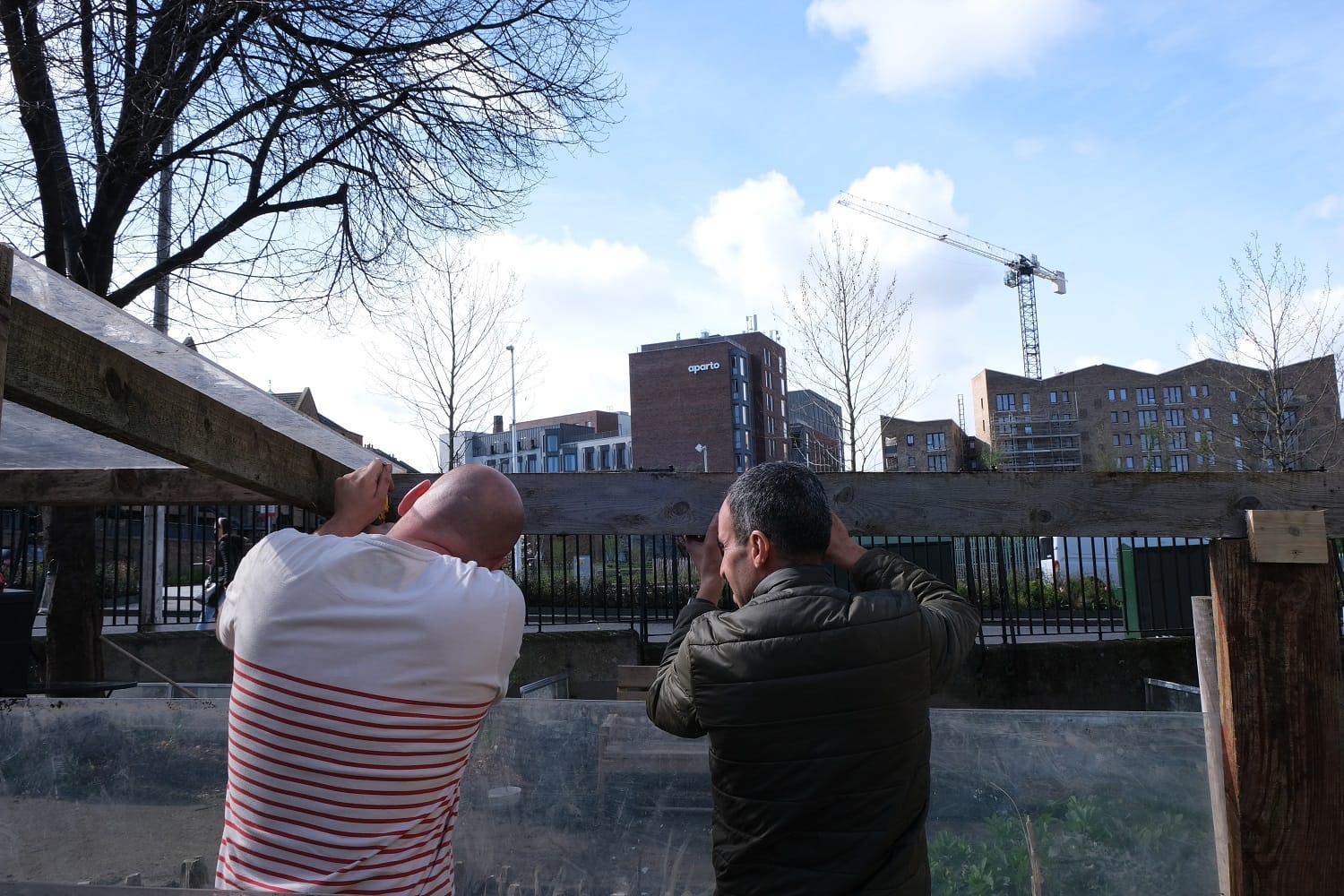Now that the council has stopped taking horse manure, it's piling up in the Liberties
“So the council is allowing horses in Dublin City,” says horse owner David Mulraney. “But they’re not allowing them to put their horse manure anywhere.”
Civil society groups have called for a new post within the council to progress its policies around urban farming and growing.

When Abderrezak Meddar moved into the Oliver Bond flats in the Liberties in March 2020, the garden outside his ground-floor window didn’t look nice, he says. “The garden was full of broken glass.”
The large communal green area sits on the west side of the complex.
People would gather outside his window to smoke, he said on Sunday 2 April, standing inside the garden and pointing to a spot under a balcony.** **
“I could hear them talking and that would wake me up,” he said. “I didn’t want to get in trouble and tell them not to stand here.”
Other residents say the metal black gate to the garden inside the complex would be open all the time, and the ground scattered with dog poo.
Meddar says that, the very next morning after he realized his window was a common gathering place, he went out and cleaned the ground beside his window and sowed daffodils, mint, rosemary and onions, hoping that they wouldn’t be trodden on, and that he would get some peace.
“A couple of days later, after cleaning and preparing the soil, when the garden started looking nice, the neighbours started to help me to clean it all,” he said.

What Meddar had taken up on a whim chimes with Dublin City Council policy.
The council commits to support urban farming and food production, including on underused sites and in residential developments, according to the city’s current development plan 2022–2028.
But Meddar and his neighbours say they could do with more support from the council to help them keep up their grassroots community patch in the social-housing complex – but just can’t get the council to fully engage.
Funding for equipment and supplies would help, Meddar says, and support for organising community events and outreach. As would advice on gardening and best practices, choosing plants, he says.
He emailed the council last year and again last month, he says, to ask. “We have not received a reply yet.”
Last year, Dublin Community Growers, a citywide volunteer network, asked the council to set up a designated post to work with local communities to develop, advise, and support community growing projects, gardens and allotments.
But the council said it didn’t have enough money to do that, says John O Donoghue, a member of the Dublin Community Growers Committee.
A spokesperson for Dublin City Council said that community gardens and allotments are supported both by the council’s area offices and its Parks, Biodiversity and Landscape Services on a case-by-case basis.
Meddar, known by his neighbours as “Ezak”, has worked on the garden every Sunday for three years.
He has built a small greenhouse for tomatoes with some recycled shower doors. He learned how to make his own compost without attracting foxes.
The community garden blends with the communal area for the neighbors of the adjacent blocks.
The plot full of veggies and flowers outside his window now has an L-shape. It stretches for about 20 metres from his window to the fence that faces Bridgefoot Street and continues south for another 40 metres, parallel to the sidewalk from where passersby who glance to the side can now see patches of green beans, onions, brussel sprouts, chard, and strawberries.
Over time, the number involved in the garden has waned, says Meddar.
At the peak, there were eight or nine people committed to the project, he said. “And then they started to pull back bit by bit because we don’t have support from the city council.”
There’s another community garden over at Bridgefoot Street **Park **a few metres away from the flats, says Anthony Freeman O’Brien, one of the volunteers with the Oliver Bond garden.
But that’s different, he says. “There’s more pride in your home.”
“Isaac has given self respect to people to look after and maintain their own area,” says O’Brien. “But now they have something to protect so they will.”
Nowadays, the Oliver Bond community garden has few volunteers, says Meddar. “I don’t do it for money or to be paid for, I do it because it’s my hobby but not everybody is willing to work for free.”
He has an idea for a project to get younger neighbours involved, he says. “The plan is to grow things and then put them in pots and sell them and make some money to give to the kids.”
“That way the kids would help.That way they wouldn’t need to cause trouble, because they do that because of the money,” says Meddar.

Says Freeman O’Brien: “They need to make money and earn respect.”
Residents in the flat complex have been signalling alarm at the rise in drug-dealing in the area.
That path sets kids up for a hard, horrible life, says Freeman O’Brien.
“The idea of an easy life selling drugs is totally wrong. You spend the rest of your life stressed out, people watching over your shoulder, it’s just constant trouble,” he says.
Contrast that with the opportunity to earn money through the community garden, he says. “You don’t have to worry about anything really. You can feel good about yourself, feel that you’ve done something good.”
After three years of work, some residents say the most important part of the community garden is that it’s a space they can enjoy.
On that Sunday afternoon in the garden, volunteers would pause mid-conversation to saw up long logs of wood, and screw them up between the frame of a half-built structure.
“We are building a greenhouse to be able to plant tomato, cucumber, and more,” said Meddar. In the near future, maybe they’ll add a shed, he said.
While the residents of Oliver Bond are struggling to keep the garden growing, the fact that it is on land within a social housing complex does bring some benefits.
Most community gardens only have temporary use of the site, that is why the land where they are situated is so important, said O Donoghue of the Dublin Community Growers Committee.
Dublin City Council manages the premises of the social-housing complex at Oliver Bond flats. But its contribution to the garden, says Freeman O’Brien, is limited to cutting the grass every now and then.
Meddar asked Dublin City Council for help, he said. But “they didn’t treat me seriously, they didn’t see the value”.
“From my understanding they don’t deal with individuals, but I’m not an individual, I’m a local, I’m from the flats and they’re supposed to serve the community, to serve the flats,” he said.